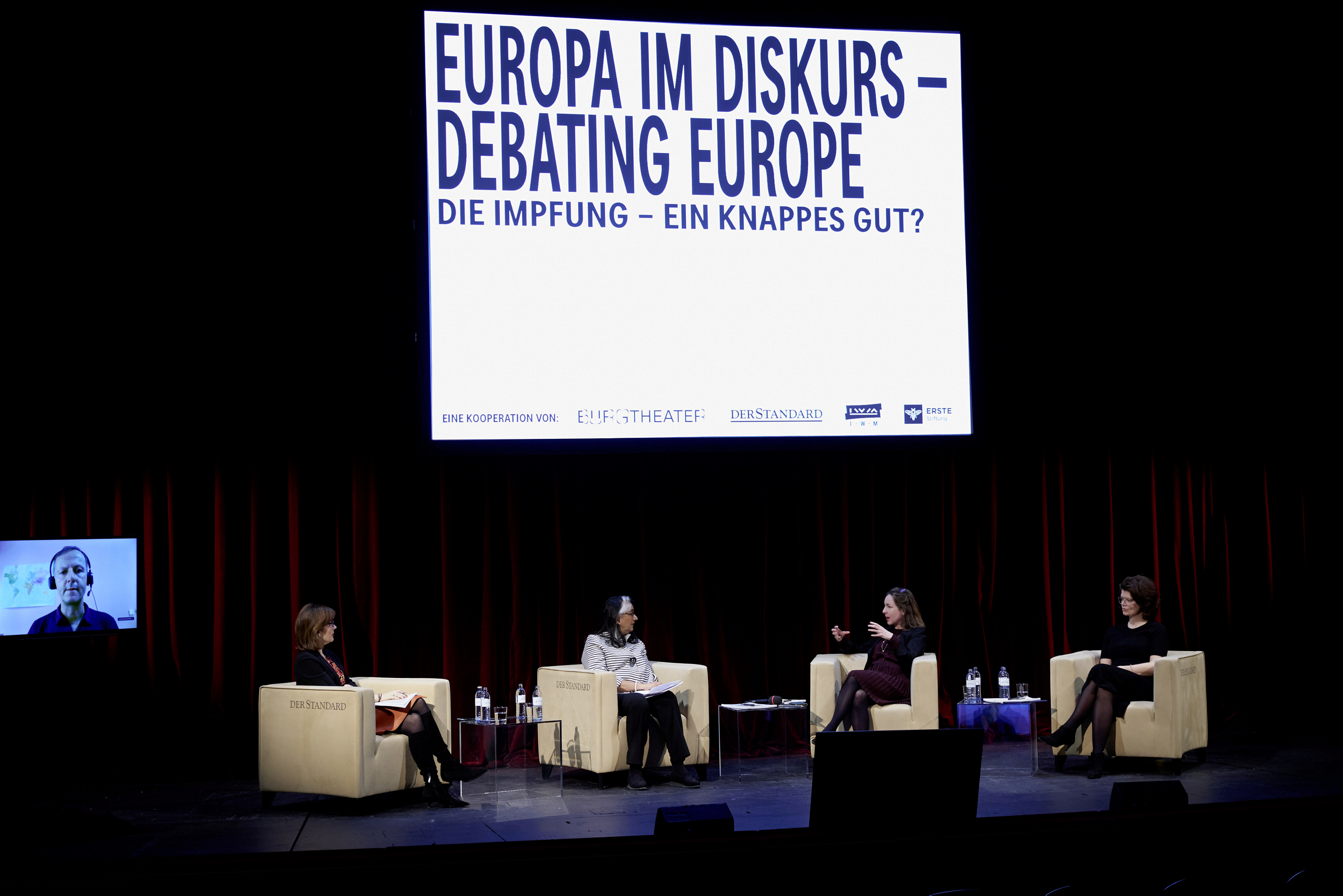On Sunday morning, experts discussed the limited availability of vaccines against Covid-19 in the empty Burgtheater but in front of an online audience.
Burgtheater director Martin Kušej made a clear appeal as he opened the discussion in the Debating Europe series, a collaborative event between the IWM Institute for Human Sciences, Erste Foundation, the Vienna Burgtheater and Austrian daily newspaper Der Standard. “We can’t and we won’t accept this as normal,” he stated, addressing his words to the government as he faced the empty auditorium.
Once moves to reopen society make social life in the evenings possible again, then theatres must also reopen, he demanded. The current situation is “unnecessary and not what we deserve”, he stated. The auditorium is a “safe place”, Kušej assured his audience, referring to the Burgtheater’s powerful ventilation system.
In front of empty rows of seats, but streamed live to individual listeners, the experts then turned their discussion to an element that will contribute in future to ensuring that theatres are no longer merely storerooms for props: the coronavirus vaccination.

Debating Europe at Burgtheater: Marcus Bachmann (via live stream), Ursula Wiedermann-Schmidt , Shalini Randeria (chair), Barbara Prainsack and Katharina T. Paul . Photo: © Robert Newald / DER STANDARD
The discussion made it clear that vaccination will be just one element among many that will restore us to normality in whatever form. And if viewpoints remain as restricted within national borders as they currently are, the pandemic will probably accompany us for longer than many people currently hope. After all, “No one is safe until we’re all safe”, as moderator and IWM rector Shalini Randeria put it, quoting international organisations that have been warning for months against excluding the global South.
Marcus Bachmann is currently in Nigeria with Médecins sans Frontières (MSF). He reported that the first delivery of vaccine arrived recently: however, this isn’t even enough to vaccinate healthcare professionals. And 130 countries still haven’t received a single dose, he added. To counter this shortage, the patent system must be challenged, says Bachmann: “An enormous amount of potential in this area is not being used.”
Global immunisation coverage
There are not only moral arguments against this unequal distribution; there are also counter arguments from a public health viewpoint, according to vaccinology professor Ursula Wiedermann-Schmidt: “Ultimately we need global immunisation coverage.” She quoted the example of the elimination of smallpox that only succeeded thanks to a global approach.
However, while the prospect of vaccinations currently doesn’t even exist for the populations of many countries, people in Austria are doubtful of the necessity or tolerability of the vaccines. There is encouraging news in this context, however. Political scientist Barbara Prainsack spoke of a “very nuanced picture” in relation to attitudes to vaccination against Covid-19.
Katharina T. Paul, a political scientist, also claimed that willingness to be vaccinated is now growing: after a low point in October (32 percent), by January 47 percent were willing to be vaccinated. This willingness increases in relation to how well-informed people feel. Wiedermann-Schmidt, on the other hand, pointed out a policy of “excess information”, which is often “indigestible”. In the past, no one was interested in who manufactured a vaccine.
Not a universal panacea
Prainsack emphasised that in any case, a “green passport” could also be a transitional instrument leading towards normality. Her colleague Paul pointed out the necessity of precisely targeting any such instrument: “Who decides when the passport is no longer needed?”
The debate addressed the fact that the coronavirus will probably not be the last pandemic. So what could one do better in future? Wiedermann-Schmidt suggests relying on prevention. Individual measures, even a vaccination, can “never be a universal panacea”. An overall strategy could, however, lift the burden and enable us to “live more easily” again – including art and culture.
Original in German. First published on 14 March 2021 on derStandard.at.
Translation into English by Bridget Schäfer.
This text is protected by copyright: © Vanessa Gaigg /DER STANDARD. If you are interested in republication, please contact the editorial team.
Copyright information on pictures, graphics and videos are noted directly at the illustrations. Cover: People waiting for a vaccination in Mexico. Photo: © Ulises Ruiz / AFP / picturedesk.com
Debating Europe
Vaccination – a scarce good?
Sunday, 14 March 2021, 11 am, Burgtheater Vienna
“No one is safe before we are all safe”, warn international organizations of the vaccine nationalism that has emerged in the whole world. With the Covid vaccines available for now, urgent new questions arised: Who determines which countries and population groups have access to a vaccine? Do we need a global vaccination strategy to win the race against the spread of mutations? What lessons can we learn from previous pandemics and the history of vaccination?
Panelists:
Katharina T. Paul
Senior Research Fellow, Institute for Political Science, University of Vienna
Barbara Prainsack
Professor for Comparative Policy Analysis and Member of the ethics committee in the fields of Social and Economic Sciences of the University of Vienna
Marcus Bachmann
Advocacy and Humanitarian Affairs Represenative, Doctors without Borders
Ursula Wiedermann-Schmidt
Professor of Vaccinology and Head of the Institute of Specific Prophylaxis and Tropical Medicine at the Medical University of Vienna
Moderator: Shalini Randeria
Rector of the Institute for Human Sciences (IWM) in Vienna
“Debating Europe” is a cooperation of the Institute for Human Sciences (IWM), ERSTE Foundation, Burgtheater and DER STANDARD.
